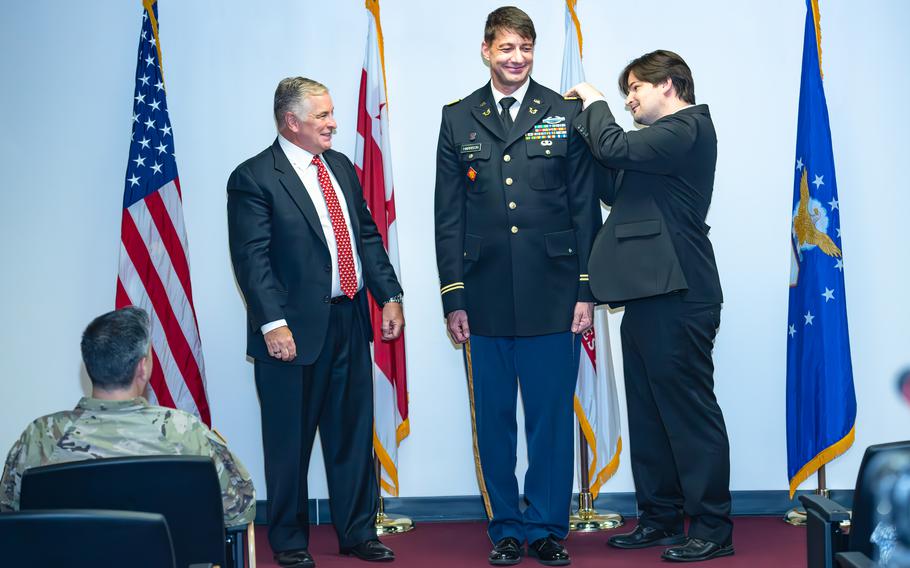
A Defense Department policy barring HIV-positive people from enlisting in the military is unconstitutional, a federal judge ruled Aug. 20, 2024. The ban is considered the last major hurdle denying full military service to people with HIV. (Joseph Barron/Air Force)
A Defense Department policy that advocates called the last major barrier to full military service for people with HIV was struck down this week by a federal judge in Virginia.
HIV-positive people with undetectable viral loads and no symptoms were barred from joining the armed forces under the policy.
U.S. District Judge Leonie Brinkema ruled Tuesday that it was irreconcilable with scientific evidence concerning HIV treatment and transmission, calling it “irrational, arbitrary and capricious.”
The ruling came after civil rights defender Lambda Legal filed a class-action lawsuit on behalf of the advocacy group Minority Veterans of America and three people who were unable to enlist or reenlist because of their HIV status.
They argued that DOD was in violation of their Fifth Amendment right to due process.
Attorney Peter Perkowski of Minority Veterans of America, who represented the plaintiffs, called on DOD to immediately comply with the ruling.

Officer candidate Nick Harrison, District of Columbia National Guard, is pinned the rank of first lieutenant by Baraq Stein, his partner at right, and Kevin Jennings, CEO of Lambda Legal, during a ceremony at the D.C. Armory on Aug. 5, 2023. Harrison successfully challenged the military’s discriminatory policies against service members living with HIV, leading to a landmark federal court decision affirming their right to serve and be deployed. (John Jack/Army)
“We are thrilled the court has ruled in our favor and agreed that the military’s outdated policies blocking people living with HIV from enlisting are unconstitutional,” Perkowski said in a statement by Lambda Legal on Tuesday. “Thanks to modern science, there is no legitimate reason to continue denying people living with HIV the ability to enlist.”
In 2022, the Pentagon announced that service members would no longer be discharged or separated from the military for testing positive for HIV. Nor would HIV-positive personnel with undetectable viral loads and no symptoms be prevented from deploying.
However, HIV would continue to be a disqualifying condition for those not already serving and wishing to enlist or commission.
The policy change followed rulings in Harrison v. Austin and Roe v. Austin in 2018 that ordered the military to stop discriminating against service members living with HIV.
In the current case, the Defense Department argued that certain deployments could make it difficult for HIV-positive troops to take their medication, resulting in a rebound of their viral loads.
The Pentagon also contended that allowing HIV-positive recruits would impose disproportionately high costs on the military and that sending HIV-positive troops to countries with access restrictions pertaining to the virus could be difficult, according to court documents.
Brinkema was not swayed, writing in her opinion that some of DOD’s arguments amounted “to the same set of justifications offered in Harrison and Roe.”
“Merely labeling an argument as new does not make it so,” she added.
DOD did not immediately respond to a request for comment Wednesday.
Antiretroviral therapy to treat HIV — or human immunodeficiency virus, which causes AIDS — became widely available in the late 1990s.
Within several months of starting treatment, a person’s viral load becomes suppressed, allowing the virus to drop to undetectable levels. At that point, those who take their medication cannot transmit the infection to HIV-negative partners through sex.
Isaiah Wilkins, the main plaintiff in the case, had been admitted to the U.S. Military Academy Preparatory School and had signed an Army Reserve contract when he tested positive for HIV during a medical exam.
Wilkins, 24, was separated because of his health status. Following the ruling, he said he would resume his studies at the prep school.
“Giving up on my dream to serve my country was never an option,” Wilkins said in the Lambda Legal statement. “I am eager to apply to enlist in the Army without the threat of a crippling discriminatory policy.”